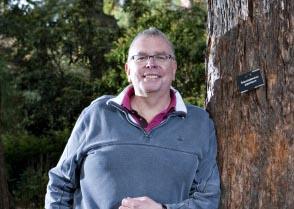
"Health wise I am feeling great. I am a big supporter of trials - it allows new treatments and drugs to be brought in.”
Please note - this trial is no longer recruiting patients. We hope to add results when they are available.
This trial is looking at using magnetic resonance imaging (MRI) to pick up early signs that prostate cancer is starting to press on the spine. This trial is supported by Cancer Research UK.
Sometimes prostate cancer can spread to the backbone (spine). This can cause pressure on the long bundle of nerves in the backbone (the spinal cord). Doctors call this spinal cord compression. The symptoms of spinal cord compression include pain and numbness. People with spinal cord compression need to have treatment quickly to relieve the pressure.
Doctors often use an MRI scan to confirm any symptoms of spinal cord compression. The researchers think that MRI scans may be used to find early signs of spinal cord compression before symptoms happen. This means treatment can start earlier, which may prevent the most severe symptoms.
The aim of this trial is to see if MRI scans can be used to find early signs of spinal cord compression before you have any symptoms.
You may be able to enter this trial if
You cannot enter this trial if
 carcinoma and early bladder cancer that is not likely to spread (low grade)
carcinoma and early bladder cancer that is not likely to spread (low grade)This is a phase 3 trial. It will recruit 414 men. It is a randomised trial. The people taking part are put into 1 of 2 groups by a computer. Neither you nor your doctor will be able to decide which group you are in.
The men in group 1 will continue to be seen as usual. If you develop signs or symptoms of spinal cord compression you will receive treatment.
The men in group 2 will have a MRI scan. If this shows early signs of spinal cord compression you will have treatment. You then have a MRI scan every 6 months. If the scan doesn’t show signs of spinal cord compression you will see your doctor as usual.

The trial team will ask you to fill out a questionnaire when you agree to take part in this trial and then every 3 months for 3 years. The questionnaire will ask about side effects and how you’ve been feeling. This is called a quality of life study.
If you develop early signs of spinal cord compression the team will ask you to fill out another questionnaire about 3 months after your treatment.
You see the doctor to have some tests before taking part in this trial. These tests include
After agreeing to take part, the men in group 2 will have a MRI scan.
You see the doctor every 3 months for 2 years and then every 6 months for a year.
MRI scan is a safe test and the researchers don’t anticipate any side effects.
You can find more information about MRI scans in our cancer tests section.
Please note: In order to join a trial you will need to discuss it with your doctor, unless otherwise specified.
Professor David Dearnaley
Cancer Research UK
Experimental Cancer Medicine Centre (ECMC)
Institute of Cancer Research (ICR)
NIHR Clinical Research Network: Cancer
The Royal Marsden NHS Foundation Trust
This is Cancer Research UK trial number CRUK/11/053.
If you have questions about the trial please contact our cancer information nurses
Freephone 0808 800 4040

"Health wise I am feeling great. I am a big supporter of trials - it allows new treatments and drugs to be brought in.”